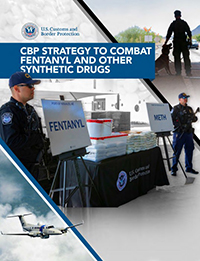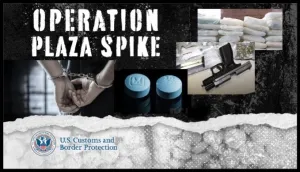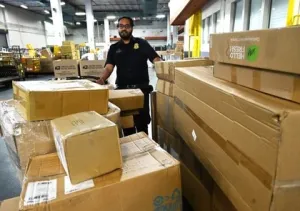CBP Access is a digital news page developed by the Office of Congressional Affairs for Members of Congress and staff. If you would like to receive an e-mail when a new CBP Access is available, please sign up for CBP Access update notifications.
In this Update | Fentanyl
- Message from the Deputy Assistant Commissioner
- Frontline Against Fentanyl: An Interview with CBP's Top Official
- CBP Strategy to Combat Fentanyl and Other Synthetic Drugs
- Focused Enforcement Operations to Combat Illicit Fentanyl
- Countering the Threat of Illicit Fentanyl Smuggled in Small Shipments
- CBP: America's Front Line Against Fentanyl
- Fentanyl Seizure Statistics
- Enforcement News from Across CBP
Message from the Deputy Assistant Commissioner
CBP’s mission to protect U.S. borders and facilitate legitimate trade and travel is not only essential to national security but also a key driver of the nation’s economic prosperity. Despite several disruptions to global trade markets caused by ongoing political conflicts and the lingering effects of the COVID-19 pandemic on supply chains, CBP continues to observe an increase in trade volume, particularly in the e-commerce and low value shipment environment. CBP remains vigilant of the threat of criminal networks and bad actors attempting to take advantage of the complexity of global supply chains to hide illicit activity, including forced labor, intellectual property violations, and the shipment of illicit drugs like fentanyl. This CBP Access update highlights just some of the strategies and programs that CBP has implemented to strengthen its enforcement posture and improve the facilitation of lawful and essential trade.
–Stephanie Talton, Deputy Assistant Commissioner, Office of Congressional Affairs
Frontline Against Fentanyl: An Interview with CBP's Top Official
In an August 21, 2024, interview, CBP Senior Official Performing the Duties of the Commissioner (SOPDOC) Troy A. Miller outlined the deliberate efforts of CBP's workforce to target fentanyl and its precursors, and the people responsible. Miller, whose CBP career spans three decades, provided an in-depth history of CBP’s earliest encounters with fentanyl and unique insights into the strategies shaping the current state of the CBP’s enforcement operations. The SOPDOC explained how the agency developed advanced tools and techniques to not only detect and identify the narcotics coming across the border, but also developed unique ways to gather intelligence and disrupt transnational criminal organizations. Visit CBP.gov for full coverage of the interview with SOPDOC Miller and to read a statement from SOPDOC Miller on National Fentanyl Prevention and Awareness Day.
CBP Strategy to Combat Fentanyl and Other Synthetic Drugs
On October 26, 2023, CBP released its Strategy to Combat Fentanyl and Other Synthetic Drugs. The strategy aims to develop a whole-of-government and international approach to combat illicit synthetic drugs, particularly fentanyl, through several coordinated efforts, including:
- Expanding collaboration and information-sharing to dismantle illicit synthetic drug networks.
- Enhancing detection capabilities – including Non-Intrusive Inspection technology and canine units – and generating actionable intelligence to target these networks.
- Conducting coordinated operations to exploit vulnerabilities in the illicit drug supply chain, focusing on the production, trafficking, and distribution of synthetic drugs.
- Promoting safe handling protocols and education to protect the CBP workforce, their families, and communities.
CBP’s multi-faceted approach aims to position CBP at the forefront of U.S. government efforts to combat fentanyl and other synthetic drugs through collaboration, intelligence, and targeted operations.
Focused Enforcement Operations to Combat Illicit Fentanyl
Guided by CBP’s Strategy to Combat Fentanyl and Other Synthetic Drugs, CBP recently launched Operation Plaza Spike, an initiative targeting Mexican cartels and gangs that facilitate the flow of deadly fentanyl. The operation focuses on “plazas,” specific territories controlled by cartels near U.S. border crossings. The first target was the Nogales Plaza, south of Nogales, Arizona, controlled by Sergio Valenzuela Valenzuela (aka Gio), a Sinaloa Cartel boss. On July 22, 2024, CBP announced an expansion of this initiative to the El Paso and Juarez region.
Operation Plaza Spike aims to disrupt fentanyl trafficking by targeting a natural chokepoint in the supply chain, focusing on intelligence gathering, degrading cartel operations, and delivering legal consequences.
Through the operation, CBP collaborates with law enforcement partners to disrupt plaza operations and neutralize plaza bosses, addressing both inbound drug trafficking and outbound weapons and currency smuggling. From October 2023 to the end of June 2024, CBP seized 418,000 pounds of drugs, including more than 15,000 pounds of fentanyl, nearly 3,000 weapons, and more than 654,000 rounds of ammunition.
Operation Plaza Spike is one of CBP’s recent efforts to stem the flow illicit opioids, including fentanyl, and to crack down on the TCOs that traffic them. CBP is also expanding its counter-fentanyl surge operation, Apollo X, across the southwest border from El Paso to San Diego. This operation will utilize CBP's full range of resources and personnel to seize fentanyl, uncover supply chains, and share critical information with state and local partners. The announcement emphasizes an "all-of-CBP" approach and enhanced collaboration with federal, state, and local law enforcement partners. These initiatives are part of CBP's broader strategy to combat illicit opioids and TCOs, leveraging advanced intelligence analysis and information sharing.
Countering the Threat of Illicit Fentanyl Smuggled in Small Shipments
CBP seizures of illicit fentanyl continue to increase at an alarming rate. Most of these seizures still occur at southwest border ports of entry, where nearly 90% of CBP’s fentanyl seizures occur, typically concealed within legitimate cargo or hidden in passenger vehicles. However, the ease of online ordering and international shipping has enabled small but deadly quantities of fentanyl to be sent directly to consumers. CBP officers regularly intercept parcels containing fentanyl, precursor chemicals, as well as pill presses and die sets, often disguised as everyday items or mislabeled to avoid detection. The threat posed by these low-value shipments must not be underestimated – a single pill press can produce thousands of illicit fentanyl pills per hour.
To address these risks, CBP developed a set of “Detect and Defeat” legislative proposals that specifically target the dangers associated with high volumes of small, low-value (i.e., de minimis) shipments. These proposals aim to enhance CBP’s ability to prevent fentanyl, fentanyl precursors, and paraphernalia from entering the United States by expanding CBP’s authority to collect and share information on small shipments and strengthening its ability to combat de minimis abuse. The proposals also empower industry partners to report suspicious behavior. These statutory changes will provide CBP with the resources and tools necessary to effectively manage this high-volume, high-threat environment.
CBP: America's Front Line Against Fentanyl
A recent article in Frontline, CBP’s magazine, provides an in-depth look at the CBP people, technology, capabilities, partnerships, and operations that form the backbone of the agency’s approach to intercept fentanyl, its precursors, and related equipment at U.S. borders. The article highlights the technology and intelligence at the core of CBP’s counter-fentanyl efforts and underscores the critical roles of frontline CBP components, such as the Office of Field Operations, U.S. Border Patrol, and Air and Marine Operations. Additionally, it emphasizes the importance of the Office of Trade’s work in analyzing supply chain vulnerabilities and targeting shipments of fentanyl precursors and equipment.
CBP’s Laboratories and Scientific Services Directorate is pivotal in identifying fentanyl, tracking smuggling networks, and using innovative methods to trace the origins of smuggled drugs. Across all operational environments, CBP is committed to protecting its workforce from the dangers of fentanyl. Drug analysis tools help minimize direct exposure, and personnel are equipped with gloves, masks, Narcan, and comprehensive training on safe fentanyl handling and exposure protocols.
CBP’s enforcement approach includes strong partnerships with federal, state, tribal, and local agencies. The agency recognizes the global nature of the fentanyl crisis and stresses the importance of ongoing vigilance and collaboration to combat this threat.
Read more about CBP’s multi-layered approach to disrupting trafficking networks and protecting U.S. communities from the threats posed by transnational criminal organizations and fentanyl.
Fentanyl Seizure Statistics
CBP is on the frontline of stopping illegal narcotics, such as fentanyl and heroin, from entering the United States. CBP’s interactive fentanyl statistics dashboard shows Office of Field Operations seizures of fentanyl and heroin by the number of doses seized, the estimated value of drugs seized, and weight beginning in fiscal year 2023. For more data on CBP drug seizures, please visit the CBP drug seizure statistics dashboard.
Enforcement News from Across CBP
CBP Officers Seize More than Half a Ton of Fentanyl in Largest Seizure in Agency History
Tucson, AZ – CBP Officers at the Port of Lukeville recently seized approximately 4 million blue fentanyl pills, weighing more than 1,000 pounds, in the largest singular fentanyl seizure in CBP history. On July 1, a 20-year-old Arizona man, who is a U.S. citizen, arrived at the Port of Lukeville driving a 2011 pick-up truck which was hauling a sport recreational vehicle on a utility trailer. While conducting a thorough inspection of the pick-up truck, trailer, and sport utility vehicle, CBP officers noticed anomalies throughout the frame of the trailer. With the assistance of a CBP canine team, officers discovered 234 packages of drugs concealed within the frame of a trailer.
CBP Intercepts Fentanyl Through Targeted International Mail Inspections
Detroit, MI – On June 2, 2024, CBP’s Office of Field Operations seized nearly six pounds of fentanyl while conducting inbound international mail inspections in Detroit. After a canine alerted to the presence of the synthetic opioid in a package, a physical inspection revealed multiple plastic bags of pills, which were identified as fentanyl through subsequent testing. The pills were seized, and the case remains under investigation by Homeland Security Investigations. The discovery is the largest of its kind for the Port of Detroit, and one of the largest inbound fentanyl seizures on the northern border within the last five years.
Border Patrol Agents Thwart Suspected Attempt to Smuggle 93 Pounds of Fentanyl
Indio, CA – Border Patrol agents from the El Centro Sector recently arrested a woman suspected of smuggling approximately 93 pounds of fentanyl pills near Indio, California. The incident took place on May 14, 1024, when agents stopped a suspicious blue sedan on Interstate 10, occupied by the woman and her teenage son. A canine unit detected drugs in the vehicle, prompting further inspection at a Border Patrol station. There, agents discovered tens of thousands of fentanyl pills concealed in a non-factory compartment beneath the seats. The woman, a U.S. citizen, was arrested and turned over to the Drug Enforcement Administration for further investigation, while her son was released to an appropriate party. This seizure is part of Operation Apollo, a counter-fentanyl initiative that emphasizes intelligence gathering and collaboration among various law enforcement agencies in Southern California and Arizona.











